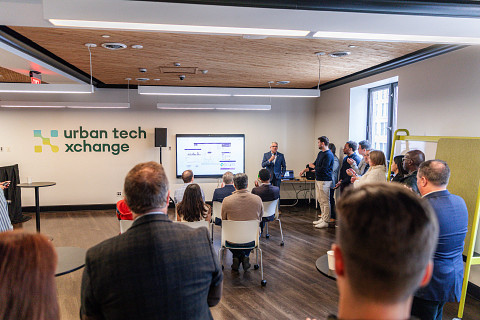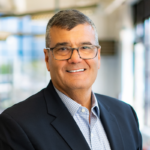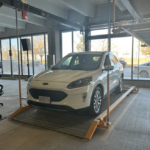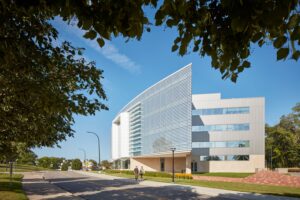
- Kim Kisner
- Business
- 02/15/2024
Focuses Include Mobility and Energy Efficiency

According to The World Economic Forum, the share of the world’s population living in cities is expected to rise to 80% by 2050, from 55% now.
This increased density combined with an aging infrastructure, a growing digital divide, and other variables brings significant challenges in terms of supporting this increase in density.
To address these challenges, NextEnergy works collaboratively to accelerate commercialization in mobility and energy efficiency.
SBND interviewed Jim Saber, NextEnergy president and CEO, about its work.

Q: Tell me about NextEnergy
A: NextEnergy is a nonprofit corporation with a mission to accelerate smarter, cleaner, and more accessible solutions for communities and cities.
We partner with innovators to facilitate the commercialization, testing, and deployment of technology in the energy and mobility spaces. We also work with the public sector to help educate on how these solutions can improve the quality of life for people who live, work, and visit their communities.
Q: What is the impetus behind NextEnergy?
A: Our focus has always been on creating and accelerating new use cases (how a product or service could be used), new applications, and new sectors for the state of Michigan.
We were established in 2002 with funding from the Michigan Economic Development Corp. Our goals have remained consistent: To create new opportunities for Michigan to design, develop, and produce new solutions in energy and mobility.
Q: Your services include project and program development, market business and trend research, consortium building, infrastructure assessment and design, and custom energy analysis. What are some examples of projects you are working on within these services?
A: When it comes to project and program development, NextEnergy partners with Michigan-based companies from startups to Tier 1 automotive suppliers, and energy providers to develop collaborative programs to allow technology to move forward. We are also heavily involved in securing funds from the U.S. Departments of Commerce, Energy, and Transportation among others to bring new solutions to the market.
Most recently we’ve been called on to manage two facilities on behalf of industries. These are the Detroit Smart Parking Lab (DSPL) and the Urban Tech Xchange (UTX). These facilities are set up to partner with industry innovators to test and demo new solutions in real-world environments.
The DSPL is used to develop solutions for automated parking, charging, sensing applications, and more, to provide data to developers and city planners on how to manage spaces. This is a consortium between Bosch, Ford, Bedrock Detroit, and the Michigan Office of Future Mobility and Electrification.

The Urban Tech Xchange operates in the same way, with a focus on the built environment. This is a consortium between Bosch, Bedrock Detroit, KODE Labs, and Cisco.
On the market business and the research side, we help companies understand how their solutions best fit the market, assist with the best ways to go to market, who to partner with, how to work with the public sector, and more.
When it comes to consortium building, an example of a project we are working on is the development and testing of components that allow for fast fueling of Class 8 trucks (33,001+ pounds), using hydrogen.
Within the areas we focus on – mobility and energy – all of the new applications require additions and modifications to existing buildings and property infrastructure. Our team works with companies, cities, and communities to assess where solutions are best deployed, determine how to make them more cost-effective, and understand how best to design and execute, and how to bring it all together.
Q: In what ways do you think NextEnergy is making a difference in Southeast Michigan when it comes to sustainability?
A: Many of the companies we work with are in Southeast Michigan. I think the work we do to help these businesses bring new solutions and opportunities to market helps them to become more sustainable and employ more people.
Outside of Southeast Michigan, we are working with MiNextCities to help create resilient communities in Dearborn, Marquette, and Flint.
Q: Tell me about the work you are doing in Dearborn.
A: The goal here is to improve community health and minimize the impacts of natural occurrences in the city. We have worked with the city on two areas:
The first is planning and preparation to restore city services and mitigate losses from flooding as a result of storms. We’ve been able to partner with the city and companies to install technology that involves real-time sensing and AI monitoring of rising water within the stormwater system. This helps draw comparisons from past events to predict and then mitigate the impacts of flooding, saving the city and residents money, and minimizing health and energy impacts.
The second focus in Dearborn has been on air quality. We partnered with Just Air – a startup in Detroit – that takes air quality measurements and brings them into a dashboard in a user-friendly way so that residents can get real-time information on air quality and determine if they should stay inside, etc.
Q: In what other ways do you work on and impact sustainability?
A: Part of our mission is to move forward solutions at the micro and macro levels that allow us to use less energy. Simply put, the most valuable kilowatt hour of energy is the one you don’t have to use.
Creating new mobility applications and solutions for how we move people and goods is another way.
Through the MEDC Office of Future Mobility and Electrification, we have been able to support innovators with local Michigan partners (investors, businesses, and communities) to deploy new mobility technology in the state. We have deployed tech in over 30 Michigan communities such as EV charging stations, automated vehicles, and applications that make mobility more accessible.
We are affiliated with Michigan Clean Cities (MICC), which is part of a national network of Clean Cities Coalitions supported by the federal government. Its mission is to reduce dependence on fossil fuels for transportation and its work focuses on education, outreach, and community engagement. One of the newer projects under MICC is the Affordable Mobility Project (AMP). AMP is a car-sharing deployment focused on increasing access to zero-emission mobility in underserved communities.
Q: What are your biggest challenges?
A: As a nonprofit, we are relatively small and operate as lean as possible, so a constant challenge is determining which projects we should take on to move the needle. We constantly need to ensure that we are choosing the right projects that will offer the best societal return.
Q: What does NextEnergy’s future look like?
A: Our services and mission will remain largely the same. The difference will be the programs we are working on. Will it be water? The role and impact of hydrogen? Whatever those applications are, our work will always focus on moving forward solutions that improve quality of life.
Be sure to subscribe to our newsletter for regular updates on sustainable business practices in and around Detroit.
Kim Kisner
- All
- Business
- Community
- Education
- Events

The Chip Bag Project, based in Detroit, is a sustainability initiative that upcycles hard-to-recycle snack packaging — particularly chip bags — into insulated sleeping bags for individuals experiencing homelessness. Founded by Eradajere Oleita, the project addresses both environmental waste and housing insecurity by transforming materials like Mylar into practical, thermally efficient solutions. In June, Oleita was among Trelllis’s 30 Under 30, its annual recognition of the brightest young...

PowerPanel, headquartered in Oxford, focuses on sustainable energy technology with a particular emphasis on hot water systems and thermal energy capture. The company designs and manufactures modular solar hybrid systems that integrate both photovoltaic and thermal components into a single unit. Its goal is to offer energy solutions that are more efficient, durable, and economically viable for a range of commercial and industrial applications. SBN Detroit interviewed Garth...

The Detroit VA Healthcare System is implementing a systemwide sustainability strategy through its Green Environmental Management System (GEMS), designed to reduce waste, lower energy consumption, and improve operational efficiency. The program recently earned Practice Greenhealth’s “Top 25 Environmental Excellence Award.” Through coordinated efforts across departments and a commitment to innovation—particularly in high-resource areas like dialysis—the Detroit VA works to demonstrate how environmental stewardship and clinical care can go...







